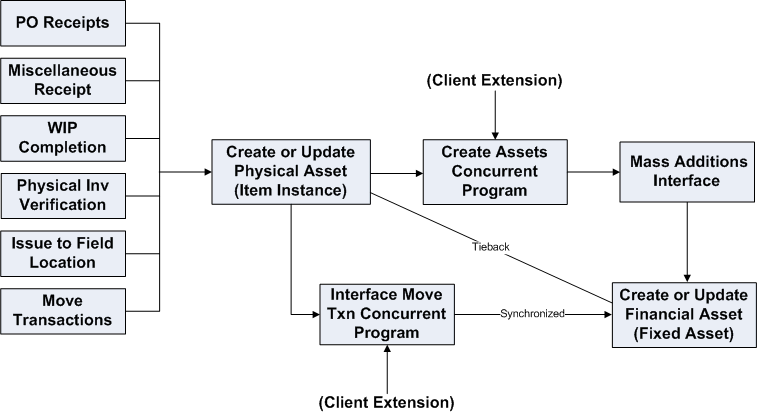Using Oracle Asset Tracking Client Extensions
This appendix covers the following topics:
Overview
Client extensions enable users to extend Oracle Asset Tracking by allowing custom logic to supersede the default logic shipped with OAT which is used during the asset creation process or synchronization of asset moves.
Client extensions are supported for all capitalization flows.
Important: Custom code written within client extension stubs are preserved during the regular patch application.
Client Extensions Process Flow
Oracle Asset Tracking Client Extensions - Process Flow

List of Supported Client Extension Stubs
The following client extension stubs can be used to derive the attributes for a fixed asset during the asset creation process using the Create Assets Interface Inventory Transactions to Fixed Asset concurrent program.
| Client Extension Stub | Usage |
|---|---|
| cse_asset_client_ext_stub.get_asset_description | To override the default functionality of deriving the description on an asset |
| cse_asset_client_ext_stub.get_asset_category | To override the default functionality of deriving an asset category |
| cse_asset_client_ext_stub.get_book_type | To override the default functionality of deriving the Fixed Assets Book Type code |
| cse_asset_client_ext_stub.get_date_place_in_service | To override the default functionality of deriving the Date Placed In Service of an asset |
| cse_asset_client_ext_stub.get_asset_key | To override the default functionality of deriving the asset key |
| cse_asset_client_ext_stub.get_deprn_expense_ccid | To override the default functionality of deriving the Depreciation Expense code combination ID |
| cse_asset_client_ext_stub.get_search_method | To override the default functionality of deriving the search method to be used to search for an existing asset |
| cse_asset_client_ext_stub.get_tag_number | To override the default functionality of deriving the tag number of an asset, if applicable |
| cse_asset_client_ext_stub.get_model_number | To override the default functionality of deriving the model number of an asset, if applicable |
| cse_asset_client_ext_stub.get_manufacturer | To override the default functionality of deriving the manufacturer of an asset |
| cse_asset_client_ext_stub.get_employee | To override the default functionality of deriving the employee assigned to an asset |
| cse_asset_client_ext_stub.get_payables_ccid | To override the default functionality of the deriving the Asset Clearing Code combination ID |
The following client extension stubs can be used to derive the attributes for a fixed asset during the asset move synchronization process using the Interface Move Transactions to Oracle Assets concurrent program.
| Client Extension Stub | Usage |
|---|---|
| cse_asset_client_ext_stub.get_asset_category | To override the default functionality of deriving an asset category |
| cse_asset_client_ext_stub.get_book_type | To override the default functionality of deriving the Fixed Assets Book Type code |
| cse_asset_client_ext_stub.get_deprn_expense_ccid | To override the default functionality of deriving the Depreciation Expense code combination ID |
| cse_asset_client_ext_stub.get_search_method | To override the default functionality of deriving the search method to be used to search for an existing asset |
| cse_asset_client_ext_stub.get_employee | To override the default functionality of deriving the employee assigned to an asset |
The default value of the hook (x_hook_used) is 0 when empty stubs are shipped with Oracle Asset Tracking. In order for the custom logic to be enforced by OAT, the hook should be set to a value of 1. It is suggested that you define appropriate error handling routines to capture exception messages.